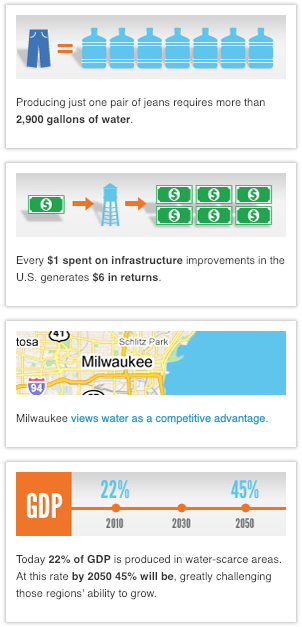 Without water, neither small businesses nor major global industries can function. Not family farms or major agribusinesses. Not energy production facilities or computer manufacturers or steel companies. Similarly, poor water quality, or limited or unreliable access to water means higher costs for all businesses – and all consumers. Water scarcity means greater risks for a community’s long-term viability and a negative impact on their competitiveness. It also means that a community’s ability to grow and create jobs is at risk. Regardless of whether water has become the new oil, one thing is certain: water is ironically both taken for granted and serves as the engine of our economy. If not properly managed, water scarcity will directly affect the local ability to grow and create jobs.
Without water, neither small businesses nor major global industries can function. Not family farms or major agribusinesses. Not energy production facilities or computer manufacturers or steel companies. Similarly, poor water quality, or limited or unreliable access to water means higher costs for all businesses – and all consumers. Water scarcity means greater risks for a community’s long-term viability and a negative impact on their competitiveness. It also means that a community’s ability to grow and create jobs is at risk. Regardless of whether water has become the new oil, one thing is certain: water is ironically both taken for granted and serves as the engine of our economy. If not properly managed, water scarcity will directly affect the local ability to grow and create jobs.
 Right now, many companies already consider water resources when making decisions about where to invest or locate facilities. And they are giving preference to areas where water risks are lowest. These businesses understand what policymakers are now coming to realize: When water resources are unhealthy or unreliable, businesses cannot grow and cannot hire or sustain a workforce. Local commerce suffers, incomes decline, tax revenues fall. The effects are very real and they are felt immediately and acutely.
Right now, many companies already consider water resources when making decisions about where to invest or locate facilities. And they are giving preference to areas where water risks are lowest. These businesses understand what policymakers are now coming to realize: When water resources are unhealthy or unreliable, businesses cannot grow and cannot hire or sustain a workforce. Local commerce suffers, incomes decline, tax revenues fall. The effects are very real and they are felt immediately and acutely.
In the developing world, the lack of proper water and sanitation infrastructure constricts economic growth where growth is needed most. In parts of the United States and in many developed countries, the undervaluation of water has led to poor maintenance of aging infrastructure. Water is wasted, polluted and used inefficiently, while underground and aboveground infrastructure literally crumbles. The financial burden of upgrading these systems is compounded when action is finally taken or as emergency repairs are
implemented on a more and more frequent basis.
Water resources are essential assets, and effectively managing and leveraging them is a shared economic responsibility of business and industry, farms and factories, individuals and communities. Water resource management is an urgent and growing need. Meaningful and impactful solutions exist that will set the right course for growth and development in cities and towns the world over.

